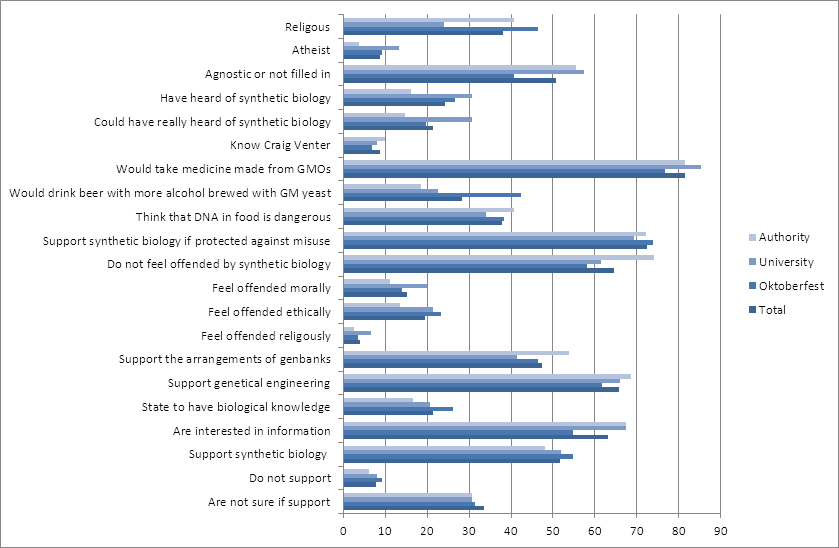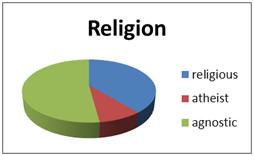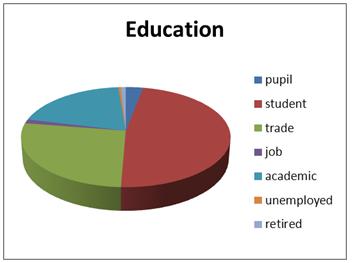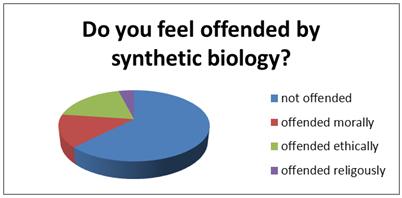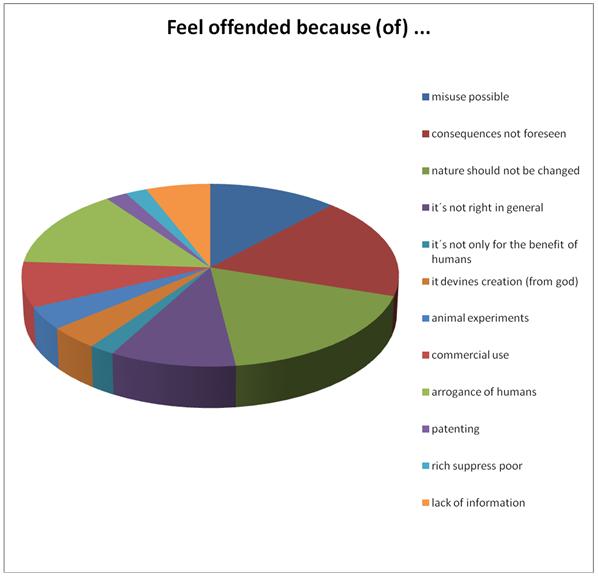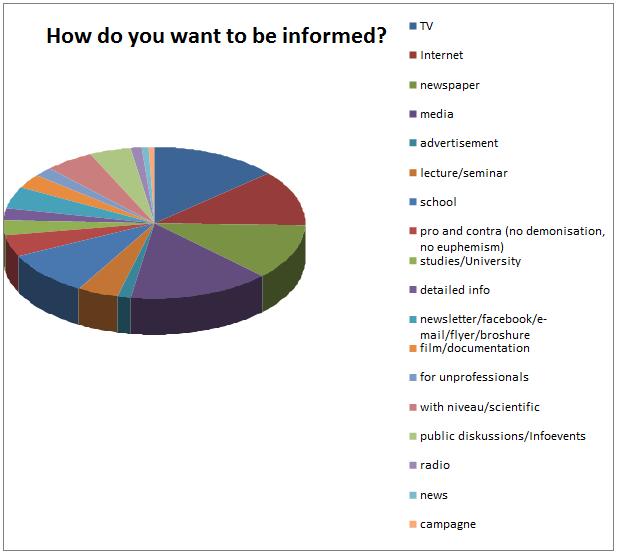Team:LMU-Munich/HumanPractice
From 2010.igem.org
(→Oktoberfest) |
(→Oktoberfest) |
||
| Line 24: | Line 24: | ||
==Oktoberfest== | ==Oktoberfest== | ||
| - | Yes, Oktoberfest. We know it may seem a strange idea to go to a place, where everyone goes just to drink beer and have fun, to ask questions about a sophisticated topic as synthetic biology. But the tempting thing about the Oktoberfest is that it is a well-known international occasion besides a typically Bavarian tradition. Together with the fact that a broad range of people could be reached there, who might be even more honest with a higher blood alcohol level than usually | + | Yes, Oktoberfest. We know it may seem a strange idea to go to a place, where everyone goes just to drink beer and have fun, to ask questions about a sophisticated topic as synthetic biology. But the tempting thing about the Oktoberfest is that it is a well-known international occasion besides a typically Bavarian tradition. Together with the fact that a broad range of people could be reached there, who might be even more honest with a higher blood alcohol level than usually, we thought it would be a fun place to go for this survey and might provide enlightening results. |
| - | And moreover it was the 200th. anniversary of the Oktoberfest, so it had to be good ... | + | And moreover it was the 200th. anniversary of the Oktoberfest, so it had to be good ... |
We asked 86 people on the Oktoberfest with an age average of 26. Sadly it wasn't that international as we hoped ... for that we should have gone in the "Festzelt" (tent where you drink beer and dance drunk on the ale-bench) ... but we did get 13 different nationalities: | We asked 86 people on the Oktoberfest with an age average of 26. Sadly it wasn't that international as we hoped ... for that we should have gone in the "Festzelt" (tent where you drink beer and dance drunk on the ale-bench) ... but we did get 13 different nationalities: | ||
Revision as of 15:55, 27 October 2010
When we were thinking about how to do human practice, we first wanted to present synthetic biology, the iGEM competition and our team at a stand in the middle of Munich. But while discussing what information we wanted to provide, we recognized that we don´t know what people already know about this topic.
So we changed our plans and conducted a survey on synthetic biology.
We asked people on their opinion of several topics, including some questions to understand more about their knowledge on biology. To gather a broad range of participants, we asked people on the Oktoberfest, at the University of Munich and an urban authority.
For the English version of our original questionary, please click
here. We also distributed a german version.
The results of our survey turned out very interesting.
Altogether we asked 242 people, with an age average of 25 years. Interestingly a bit over 51 % would support further research in synthetic biology and only about 8% wouldn't. The rest wasn't sure (yet). If misuse would have been impossible, 72.3% would support synthetic biology after all. So let's take a closer look at the data to find out, why they don't want to support it and what they know about it.
Generally, when we asked for misuses of synthetic biology, we got a huge amount of answers. 54.1% of all participants answered to that question. The most common answers have been following (we sorted them into several categories): They fear of terrorism, weapons in general, commercial use, improving humans, cloning...
About 63% wished to be better informed espacially via TV, radio, newspapers and the internet. Some of them wanted scientific information whereas others wanted general information, explained in an easy way.
Yes, Oktoberfest. We know it may seem a strange idea to go to a place, where everyone goes just to drink beer and have fun, to ask questions about a sophisticated topic as synthetic biology. But the tempting thing about the Oktoberfest is that it is a well-known international occasion besides a typically Bavarian tradition. Together with the fact that a broad range of people could be reached there, who might be even more honest with a higher blood alcohol level than usually, we thought it would be a fun place to go for this survey and might provide enlightening results.
And moreover it was the 200th. anniversary of the Oktoberfest, so it had to be good ...
We asked 86 people on the Oktoberfest with an age average of 26. Sadly it wasn't that international as we hoped ... for that we should have gone in the "Festzelt" (tent where you drink beer and dance drunk on the ale-bench) ... but we did get 13 different nationalities:
Of course ourselves being students, we also wanted to check out what other students thought about the idea of synthetic biology. We guessed, as students do have a high educational standard we might see a difference to what people think at the Oktoberfest.
Our theory in this case was, that people, who aren't informed about a topic that might include possible misuse potential, and therefore might seem frightening, would also have a bad opinion about that subject. So we hoped to see if there might be a correlation between education and knowledge about this particular subject and the support for this subject.
We asked 75 people with an age average of 24 years. Even though we didn't expect it we also found 3 extra nationalities to add to our list:
We did find a broad public at the Oktoberfest, but as many of them were not to say a bit drunk, we thought of another place with many people, that isn't exactly linked to a special group. So we considered going to the urban authority, and as people have to wait there for quite a while ... we came up with an idea: perfect, let's sugar the pill and shorten there waiting time with a little synthetic biology.
We asked 81 people with the age average of 33 years. And we again found 5 more nationalities:
Surprisingly looking at the data there wasn't a severe difference between the three locations as we would have expected.
A few interesting results:
Religous belief correlated to support of synthetic biology
As we thought that people who are religious might feel offended by synthetic biology, we wanted to take a closer look at it to see if it was really so.
... research in the field of synthetic biology
There seems to be a small tendency, that people who are religious would less support the research, but it isn't really a big difference
Profession correlated to support of synthetic biology
We thought that the profession might influence how people think about specific subjects. For example people, who work in a trade might not feel as much associated to such scientific fields as someone who is himself an academic.
... research in the field of synthetic biology
People working in a trade really do seam to support it less and more of them are unsure than in the other two categories. But again it is not such a big difference.
Profession correlated to if they think DNA in food is dangerous
We thought maybe that the educational status might correlate with how much they are informed about such topics and used this question as an indication for this.
Here it seems quite clear that those working in a trade were less informed about such topics. Also academics weren't as informed as students. This could explain why less people working in a trade would support such research and why so many are unsure about such topics, as they aren't informed good enough.
If they think DNA in food is dangerous correlated with if they support synthetic biology
Here we wanted to test the theory, that people who are badly informed or even scared of such biological topics will support it lesser or make them unsure of what they should think about it.
... research in the field of synthetic biology
This shows that our theory seems right and that insecurity on such topics leads to disaproval or even more insecurity on the support issue.
We thought that those who would take such medicine, should also be for further research, as only if so would it be possible to create such medicine, but not all were
Support of genitical engeneering correlated with support of synthetic biology
We wanted to check if there were any "new opposers" or if all those who were against genetical engeneering also were against synthetic biology, as these two research fields relate to each other.
And also of all who wouldn't support synthetic biology, 79% also don't support genetical engineering. So only 21% are "new opponents" seeing new problems in synthetic biology.
But also some who don't support genetical engineering would support synthetic biology.
Overall many of the people we asked weren't informed on the topic of synthetic biology, but they were interested in getting further information. This could be realised by education in school and university, but also by infoevents and public discussions.
Due to the lack of information there seemed to be a uncertainty wether to support research or not.
Many who didn't want to support synthetic biology also didn't support genetical engineering. This is due to the problems and risks that are connected with manipulating organism. But also a few against genetical engineering were also for synthetic biology showing that many didn't feel a direct risk to their life by synthetic biology as with open field experiments of genetical engineering and mosanto.
But at the end we had a quiet positiv picture and this could be even improved if the people would be better informed on this topic.


![]()
![]()







![]()
![]()

![]()
Contents
Human Practice
Evaluation
Oktoberfest
University
Urban authority
Data
So we will now only show the overall data, as there really was not such a difference between the three locations. Let's first go through the questions and then we will go to special correlations between different answers.
Correlations
If they would take medicine created by synthetic biology correlated to support of synthetic biology
... research in the field of synthetic biology
... research in the field of synthetic biology
conclusion
![]()
![]()

 "
"



